Browse: Page 60
By europolice on 2. Dezember 2010
 Matthias Monroy
Matthias Monroy
Estland und Frankreich schlagen gemeinsamen Standort der zukünftigen Agentur für die Polizeidatenbanken der Europäischen Union vor
Die Überlegungen zum Sitz der „Agentur für das Betriebsmanagement von IT-Großsystemen im Bereich Freiheit, Sicherheit und Recht“ gehen in eine neue Runde. Nur Frankreich und Estland hatten einen entsprechenden Antrag für die Ansiedelung der umstrittenen neuen Behörde gestellt, die zukünftig mehrere polizeiliche EU-Datenbanken zentral verwalten soll. Nach bisherigem Stand geht es um das ins Gerede gekommene Schengener Informationssystem (SIS II), die bald in Betrieb gehende Visa-Datensammlung VIS sowie die Fingerabdruckdatenbank EURODAC. Allerdings stehen bereits Forderungen nach neuen polizeilichen Datenhalden im Raum. (weiter auf heise.de)
Posted in Biometrie, Border Control, Datenbanken, European Police, Software/ IT |
By europolice on 1. Dezember 2010
 French police have tasered an African immigrant to death in the Paris suburb of Colombes after he allegedly resisted police who tried to check his identification papers.
French police have tasered an African immigrant to death in the Paris suburb of Colombes after he allegedly resisted police who tried to check his identification papers.
Police were apparently responding to an argument that broke out between the 38-year-old Malian man and his friend at whose house he was staying.
The African immigrant was threatened with a deportation order and had been claiming that his friend owed him money.
The unnamed victim reportedly died of heart attack after he was given an electric shock with a Taser gun twice by the police. Continue reading „French police kill Mali man with Taser“
Posted in Border Control, English, European Police, Taser |
By europolice on 1. Dezember 2010
 European Union Justice and Home Affairs ministers will meet in Brussels on 2 and 3 December 2010. The European Commission will be represented by Vice-President Viviane Reding, the EU’s Justice, Fundamental Rights and Citizenship Commissioner, and Cecilia Malmström, the EU’s Home Affairs Commissioner.
European Union Justice and Home Affairs ministers will meet in Brussels on 2 and 3 December 2010. The European Commission will be represented by Vice-President Viviane Reding, the EU’s Justice, Fundamental Rights and Citizenship Commissioner, and Cecilia Malmström, the EU’s Home Affairs Commissioner.
Main agenda items: (Commissioner Cecilia Malmström)
- Negotiating directives for Passenger Name Record (PNR) agreements with the United States, Canada and Australia
- Preventing and combating trafficking in human beings and protection victims
- Combating the sexual abuse, sexual exploitation of children and child pornography
- Report of the High Level Working Group (HLG) on strengthening air cargo security
Continue reading „Justice and Home Affairs Council: 2-3 December 2010, Brussels“
Posted in Border Control, Datenbanken, English, European Police, Europol |
By europolice on 30. November 2010
 Forschung für die zivile Sicherheit
Forschung für die zivile Sicherheit
Sicherheit macht nicht an nationalen Grenzen Halt. Daher gilt es, auch in bilateralen Kooperationen außerhalb der Europäischen Union gemeinsame Stärken zu nutzen, um Forschung und Innovation zu gestalten. Ziel der Verbundprojekte ist die Entwicklung innovativer Lösungen – insbesondere zum Schutz der zivilen Bevölkerung und der kritischen Infrastrukturen, zum Katastrophenschutz und Krisenmanagement. Die deutsch-israelischen Vorhaben bilden darüber hinaus eine wichtige Grundlage für die weitere Erschließung internationaler Märkte für Sicherheitslösungen sowie für zukünftige Kooperationen in der Forschung.
In Kurzprofilen werden Verbundvorhaben und beteiligte Akteure, ihre Motivation und Ziele sowie das Anwendungspotenzial der in den Projekten entwickelten Innovationen dargestellt. Der Projekthefter ist in deutscher und englischer Sprache verfügbar. (pdf unter bmbf.de)
Posted in Forschung |
By europolice on 30. November 2010
 Vice-President Siim Kallas, meeting with the high-level group on air cargo security, today set out a series of recommentations on the EU’s response to the 30 October security alert, when viable explosive devices were found in cargo shipments originating from Yemen and transferring to US-bound flights at airports in Germany and the UK.
Vice-President Siim Kallas, meeting with the high-level group on air cargo security, today set out a series of recommentations on the EU’s response to the 30 October security alert, when viable explosive devices were found in cargo shipments originating from Yemen and transferring to US-bound flights at airports in Germany and the UK.
The recommendations from the high-level group were agreed by Member States‘ experts meeting in the Civil Aviation Security Regulatory Committee and by Commission security experts in the Directorates-General responsible for Mobility and Transport; Justice; Home Affairs, Taxation and Customs Union, and the Joint Situation Centre, working closely with the Belgian Presidency. Industry representatives were also consulted. (more on europa.eu)
Posted in English, European Police
By europolice on 30. November 2010
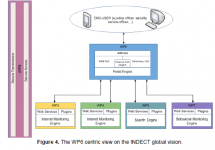 Matthias Monroy
Matthias Monroy
INDECT signalisiert Interesse am polnischen Computer-Cluster „GALERA“. Nach der polnischen Polizei wollen auch tschechische „Extremismus-Experten“ einen Prototyp des EU-Forschungsprogramms testen
INDECT (Intelligent information system supporting observation, searching and detection for security of citizens in urban environment) will bis 2013 einen Prototyp einer Überwachungsplattform für die Mitgliedsstaaten entwickeln. Laut EU-Kommission arbeitet INDECT unter anderem an der „Registrierung und den Austausch operativer Daten“, dem „Erwerb von Multimedia-Inhalten“, der „automatischen Aufdeckung von Bedrohungen“ und der „Erkennung von abnormalem Verhalten oder Gewalt“. INDECT soll demnach ein „integriertes netzwerkzentriertes System zur Unterstützung der operativen Aktivitäten von Polizisten unter Bereitstellung von Techniken und Instrumenten zur Beobachtung verschiedener beweglicher Objekte“ entwerfen. (weiter auf heise.de)
Posted in Biometrie, BKA, Crowd Control, Datenbanken, Drohnen, European Police, Forschung, Secret Service, Software/ IT |
By europolice on 29. November 2010
 Two corruption scandals that rocked the Romanian police may deepen the European partners‘ mistrust amid the the country’s efforts to join Schengen
Two corruption scandals that rocked the Romanian police may deepen the European partners‘ mistrust amid the the country’s efforts to join Schengen
By Paul Ciocoiu
The head of the Romanian police and the deputy minister of interior were sacked last week after a series of corruption scandals that has damaged its image as the institution plays a central role in the Schengen accession efforts.
Chief Commissioner Petre Toba and State Secretary Valentin Fatuloiu, deputy minister of the interior, were dismissed by Prime Minister Emil Boc at the request of the Minister Traian Igas, following two separate scandals involving Fatuloiu. Continue reading „Romanian police in corruption scandals“
Posted in English, European Police |
By europolice on 27. November 2010
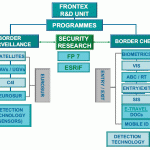 By Sergio Carrera and Elspeth Guild
By Sergio Carrera and Elspeth Guild
This paper examines the first deployment of the Rapid Border Intervention Teams (RABITs) to Greece’s external land border with Turkey on 2 November 2010. It argues that the sending of the RABITs to Greece reveals some of the core challenges inherent in Europe’s external border and asylum policies. Most importantly, it signals the limits of the principle of solidarity and fair-sharing of responsibility and the failure of the EU Dublin System. The paper argues that the sending of RABITs fails to show a long-standing (solidarity-based) answer by the EU to the situation of unrest taking place in Greece on two grounds: First, the deployment is merely of a emergency, temporary and (in)security (police)-driven nature; and second, the strengthening of the common EU external land border between Greece and Turkey may further increase the tensions by enlarging the distance between the external border control practices and Europe’s commitment to the rights and freedoms of asylum-seekers and refugees.
Sergio Carrera is Head of Section and Research Fellow at CEPS and Visiting Lecturer at the University of Kent (Brussels). Elspeth Guild is Jean Monnet Professor of European Migration Law at the Radboud University of Nijmegen, partner at the London law firm Kingsley Napley and Senior Research Fellow at CEPS. (pdf at ceps.eu)
Posted in Border Control, English
By europolice on 27. November 2010
 Produkte und Dienstleistungen im Jahr 2009
Produkte und Dienstleistungen im Jahr 2009
Personalbestand insgesamt: 255 (214), davon besetzt: 226 (185). Davon entfallen auf
* operative Tätigkeiten: 157 (126),
* administrative Tätigkeiten: 69 (59).
Im Bereich Risikoanalysen wurden 14 langfristige strategische Bewertungen, vier vierteljährliche Berichte, 294 Analyseprodukte zur Unterstützung gemeinsamer Aktionen (einschließlich wöchentlicher Briefings), 64 sonstige Berichte, einschließlich Briefings für die Verwaltung der Agentur, sowie Beiträge für andere Organisationen oder Einrichtungen erstellt. Es wurden vier reguläre Sitzungen des Frontex-Risikoanalysenetzes (FRAN) und zwei Sitzungen mit regionalen Sachverständigen veranstaltet. Sechs Ausbildungsveranstaltungen im Rahmen des Projekts FronBAC wurden mit einer Gesamtteilnehmerzahl von 108 Sachverständigen des Bereichs Risikoanalyse aus den Mitgliedstaaten und der Agentur organisiert.
Im Bereich Operative Zusammenarbeit wurden 16 gemeinsame Aktionen, zwei Pilotprojekte und 32 Rückführungsaktionen organisiert. Die Gesamtzahl der „operativen Tage“ belief sich auf 5 086. Zudem wurden vier Konferenzen veranstaltet. (pdf auf euro-police)
Posted in Border Control |
By europolice on 26. November 2010
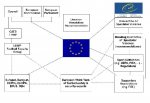 EU-Innenkommissarin Cecilia Malmström hat dieser Tage eine neue „Strategie der inneren Sicherheit“ vorgestellt. Die Strategie enthält wenig Neues und – wenig überraschend – alles, was der Datenschutz verboten hat.
EU-Innenkommissarin Cecilia Malmström hat dieser Tage eine neue „Strategie der inneren Sicherheit“ vorgestellt. Die Strategie enthält wenig Neues und – wenig überraschend – alles, was der Datenschutz verboten hat.
Das neue Strategiepapier über die künftigen fünf Handlungsschwerpunkte, das die Kommissarin am Montag der Öffentlichkeit präsentiert hat, enthält „41 Maßnahmen zur Bewältigung der dringlichsten Herausforderungen für die Sicherheit in Europa“. Tätig geworden ist die Kommission auf Initiative des Europäischen Rats. Dieser hatte im Februar 2010 sein Papier „Hin zu einem europäischen Sicherheitsmodell“ verabschiedet und darin die Kommission aufgefordert, „maßnahmenorientierte Vorschläge zur Umsetzung der Strategie zu ermitteln“. (weiter auf unwatched.org)
Posted in Datenbanken, European Police, Europol |
By europolice on 26. November 2010
 The police are seeking powers to shut down websites deemed to be engaged in „criminal“ activity.
The police are seeking powers to shut down websites deemed to be engaged in „criminal“ activity.
The Serious and Organised Crime Agency (SOCA) has tabled a plan for Nominet, which oversees .uk web addresses, to be given the domain closing power.
Nominet said the idea was only a proposal and invited people to join the debate on the form of the final policy.
IT lawyers said the proposal would be „worrying“ if it led to websites going offline without judicial oversight. (more on bbc.co.uk)
Posted in English, Software/ IT |
By europolice on 26. November 2010
 7th Space Council resolution: „Global challenges: taking full benefit of European space systems“.
7th Space Council resolution: „Global challenges: taking full benefit of European space systems“.
On 25th November, the Council of the European Union and the Council of the European Space Agency at Ministerial level issued a press release on the 7th Space Council Resolution.
The main headings touched upon are strategy and investment, the successful deployment and sustainable exploitation of the flagship programmes, Galileo and GMES, the contribution of European Space systems on climate change, Space for security, security for space, the European vision on space-exploration, the partnership on space with Africa and the governance of space activities in Europe.Link to the press release: Continue reading „Galileo and GMES: a priority for Space Ministers“
Posted in English, Space |
By europolice on 26. November 2010
 The board of the European Asylum Support Office will be meeting in Malta tomorrow and on Friday, the first time it will meet here since the EU decided that the Office will be based in Malta.
The board of the European Asylum Support Office will be meeting in Malta tomorrow and on Friday, the first time it will meet here since the EU decided that the Office will be based in Malta.
Prime Minister Lawrence Gonzi will open the proceedings.
The candidates for the seat of the Office, along with Malta, were Cyprus, and Bulgaria. Cyprus and Bulgaria withdrew their bids once the Presidency informed them that Malta had the support of the overwhelming majority of Member States. Continue reading „EU Asylum Office to hold first meeting in Malta“
Posted in Border Control, English |
By europolice on 25. November 2010
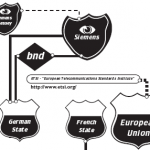 The European Commission and the Government of the United States have agreed to enhance cooperation in science and technology research to improve the shared capabilities to protect against acts of terrorism and other threats to domestic and external security. Subsequent to the EU-US Vienna Summit Conclusions of June 2006, there was mutual understanding that greater transparency is needed between the security programmes of the two parties. The Implementing Arrangement for Cooperative Activities in the Field of Homeland/Civil Security Research, signed on 18th November 2010, constitutes a formal basis for cooperation in scientific and technological research. It extends and strengthens cooperative activities in areas of common interest and encourages the application of the results of such cooperation to the economic and social benefit of the parties. The Implementing Arrangement is pursuant to the overarching Agreement for Scientific and Technical Cooperation between the Government of the United States and the European Commission, as extended and expanded to include security research in July 2009. Continue reading „EU/US agreement on cooperation in the field of security research“
The European Commission and the Government of the United States have agreed to enhance cooperation in science and technology research to improve the shared capabilities to protect against acts of terrorism and other threats to domestic and external security. Subsequent to the EU-US Vienna Summit Conclusions of June 2006, there was mutual understanding that greater transparency is needed between the security programmes of the two parties. The Implementing Arrangement for Cooperative Activities in the Field of Homeland/Civil Security Research, signed on 18th November 2010, constitutes a formal basis for cooperation in scientific and technological research. It extends and strengthens cooperative activities in areas of common interest and encourages the application of the results of such cooperation to the economic and social benefit of the parties. The Implementing Arrangement is pursuant to the overarching Agreement for Scientific and Technical Cooperation between the Government of the United States and the European Commission, as extended and expanded to include security research in July 2009. Continue reading „EU/US agreement on cooperation in the field of security research“
Posted in Biometrie, English, European Police, Forschung, Kommunikation, Robotik, Software/ IT, Space
By europolice on 25. November 2010
 A special European Crisis Reaction Mechanism should be set up to help cope with any chemical, biological, radiological or nuclear disaster caused by an accident or terrorist attack, believes the EP Civil Liberties Committee. This would enable the EU to deploy civilian and military resources more swiftly. A European Civil Protection Force – a longstanding demand of Parliament – is also needed, says the committee in a draft resolution adopted on Thursday.
A special European Crisis Reaction Mechanism should be set up to help cope with any chemical, biological, radiological or nuclear disaster caused by an accident or terrorist attack, believes the EP Civil Liberties Committee. This would enable the EU to deploy civilian and military resources more swiftly. A European Civil Protection Force – a longstanding demand of Parliament – is also needed, says the committee in a draft resolution adopted on Thursday.
Chemical, biological, radiological or nuclear (CBRN) disasters, whatever their cause, pose serious threats to the safety and the security of EU citizens and grave risks to the environment and critical infrastructures of Member States. Continue reading „EU crisis mechanism needed for disasters or terrorist attacks“
Posted in English, European Police, Militaer
By europolice on 24. November 2010
 EU-Überwachungsprojekt Indect: Test bei Fußball-EM 2012
EU-Überwachungsprojekt Indect: Test bei Fußball-EM 2012
von Alfred Krüger
Verbrecherjagd 2.0: Drohnen, die mit Kameras verdächtiges Verhalten aufspüren, Rechner, die Gesichter auf Bildern erkennen und mit anderen Daten abgleichen. Ein EU-Projekt entwickelt ein umfassendes Überwachungssystem – 2012 soll es testreif sein.
Drohnen mit hochauflösenden Spezialkameras schweben über deutsche Innenstädte – sie suchen nach Bürgern, die sich ungewöhnlich verhalten. Die Videos werden automatisch ausgewertet. Wird etwas Verdächtiges erkannt, schlagen Rechner Alarm. Programme zur Personenerkennung identifizieren die Verdächtigen und verfolgen sie über ein Netz von Überwachungskameras durch die gesamte Stadt. (weiter auf heute.de)
Posted in Drohnen |
By europolice on 23. November 2010
 Nach einer zweieinhalbjährigen Testphase bekommt Sachsens Polizei endgültig die umstrittenen Flugdrohne zur Überwachung von Fußballfans oder Verfolgung von Kriminellen. Die Drohne schließe eine Lücke bei den Kontrollmöglichkeiten, sagte Innenminister Markus Ulbig (CDU) am Dienstag in Dresden. Das ferngesteuerte Gerät liefere Bilder in hoher Qualität und sei ein Beitrag für mehr Sicherheit. Es solle bei der Überwachung und Aufklärung von Veranstaltungen und Fahndungsaktionen zum Einsatz kommen. Geplant sei auch die Dokumentation von Verkehrskontrollen oder Tatorten.
Nach einer zweieinhalbjährigen Testphase bekommt Sachsens Polizei endgültig die umstrittenen Flugdrohne zur Überwachung von Fußballfans oder Verfolgung von Kriminellen. Die Drohne schließe eine Lücke bei den Kontrollmöglichkeiten, sagte Innenminister Markus Ulbig (CDU) am Dienstag in Dresden. Das ferngesteuerte Gerät liefere Bilder in hoher Qualität und sei ein Beitrag für mehr Sicherheit. Es solle bei der Überwachung und Aufklärung von Veranstaltungen und Fahndungsaktionen zum Einsatz kommen. Geplant sei auch die Dokumentation von Verkehrskontrollen oder Tatorten.
Die Polizei filmt bislang Videos aus einem Hubschrauber und mit mobilen und stationären Kameras am Boden. Für die Drohne vom Typ MD4-1000 muss das Innenministerium nach eigenen Angaben noch einen Restbetrag von 7.500 Euro bezahlen. Seit Testbeginn hatte der Freistaat monatlich 2.380 Euro Leihgebühr für das 65.000 Euro teure Gerät ausgegeben. Continue reading „Sachsen: Polizei erhält umstrittene Flugdrohne“
Posted in Drohnen |
By europolice on 23. November 2010
 MITTEILUNG DER KOMMISSION AN DAS EUROPÄISCHE PARLAMENT UND DEN RAT
MITTEILUNG DER KOMMISSION AN DAS EUROPÄISCHE PARLAMENT UND DEN RAT
Brüssel, den 22.11.2010
KOM(2010) 673 endgültig
Die meisten Europäer müssen sich in ihrem Alltag nicht weiter Gedanken über ihre Sicherheit machen. Allerdings ist unsere Bevölkerung auch ernsten Bedrohungen ausgesetzt, die immer größere Ausmaße und ausgeklügeltere Formen annehmen. Viele der heutigen Sicherheitsgefahren sind grenzüberschreitend und nicht auf bestimmte Bereiche einzugrenzen.
Kein Mitgliedstaat kann auf sich gestellt mit diesen Bedrohungen fertig werden. Bürger und Wirtschaft sind beunruhigt. 80 % der Bevölkerung erwartet, dass die EU mehr gegen organisiertes Verbrechen und Terrorismus unternimmt. (pdf unter ec.europa.eu)
Posted in Border Control, Datenbanken, European Police, Europol, Forschung, Software/ IT, Various |
By europolice on 22. November 2010
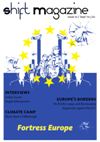 “A spectre is haunting Europe – the spectre of movement?” Movement and migration have again become the topic of parliamentary debates, pub conversations and street protests. They have become the challenge to the social, democratic and liberal veneer of European reality. That is, the continuous movement of migrants making a mockery of the idea of Europe as an impenetrable fortress, as well as the social and political movements that resist securitisation and precarity from within its borders, sometimes in solidarity with immigrants, sometimes not. The point of the collection of articles in this issue is then to start taking seriously the proposition ‘no borders’, also in the context of international no border camps such as this years’ camp at the heart of the EU’s administration in Brussels.
“A spectre is haunting Europe – the spectre of movement?” Movement and migration have again become the topic of parliamentary debates, pub conversations and street protests. They have become the challenge to the social, democratic and liberal veneer of European reality. That is, the continuous movement of migrants making a mockery of the idea of Europe as an impenetrable fortress, as well as the social and political movements that resist securitisation and precarity from within its borders, sometimes in solidarity with immigrants, sometimes not. The point of the collection of articles in this issue is then to start taking seriously the proposition ‘no borders’, also in the context of international no border camps such as this years’ camp at the heart of the EU’s administration in Brussels.
Europe is far more than a collection of borders. As crisis deepens, the up-scaling of the management of capital and populations is forced to intensify. Increasingly, this is justified through a quasi-nationalist reference to the idea of ‘Europe’. (more on shiftmag.co.uk)
Posted in Border Control, English, European Police |
By europolice on 22. November 2010
 16 Monate verdeckte Ermittlung sei zur Gefahrenabwehr gewesen – VGT widerspricht vehement: Ein Einschleusen ist zur Gefahrenabwehr nicht zulässig; Außerdem ist Gefahrenabwehr nur nach SPG möglich, das hier gar nicht anwendbar ist
16 Monate verdeckte Ermittlung sei zur Gefahrenabwehr gewesen – VGT widerspricht vehement: Ein Einschleusen ist zur Gefahrenabwehr nicht zulässig; Außerdem ist Gefahrenabwehr nur nach SPG möglich, das hier gar nicht anwendbar ist
Kürzlich wurde publik, dass eine verdeckte Ermittlerin der SOKO-Tierschutz von April 2007 bis September 2008 beim VGT eingeschleust worden war. Die Polizei hatte das immer, u.a. vor Gericht, bestritten und keine Akteneinsicht durch die Verteidigung erlaubt. Aufgrund der jetzt vom VGT vorgelegten erdrückenden Beweise machte die SOKO eine Kehrtwendung. Im heutigen Tierschutzprozess erklärte die Richterin, dass der Führer des SOKO-Spitzels, Stefan Wappel, eine verdeckte Ermittlerin die genannte Zeit im VGT eingeschleust hatte. Es habe sich dabei aber um eine Aktivität zur Gefahrenabwehr gehandelt und es sei daher nicht genehmigungspflichtig gewesen. Der VGT widerspricht vehement. (weiter auf vgt.at)
Posted in European Police, Various




















